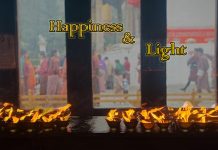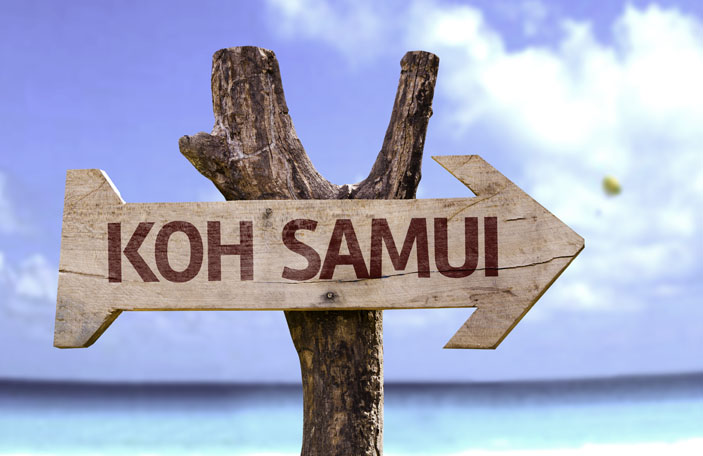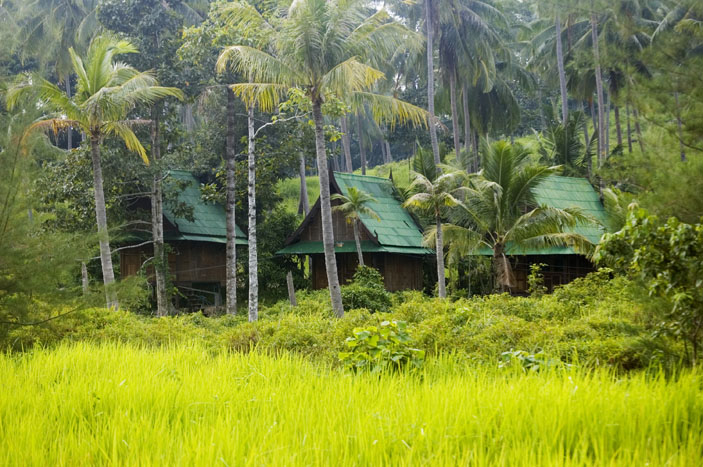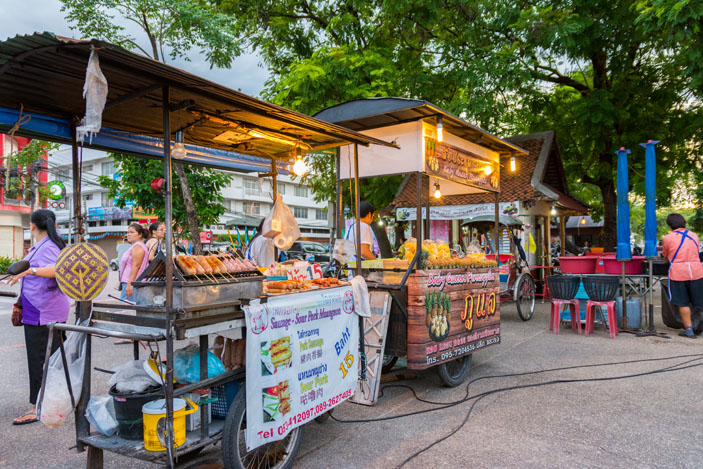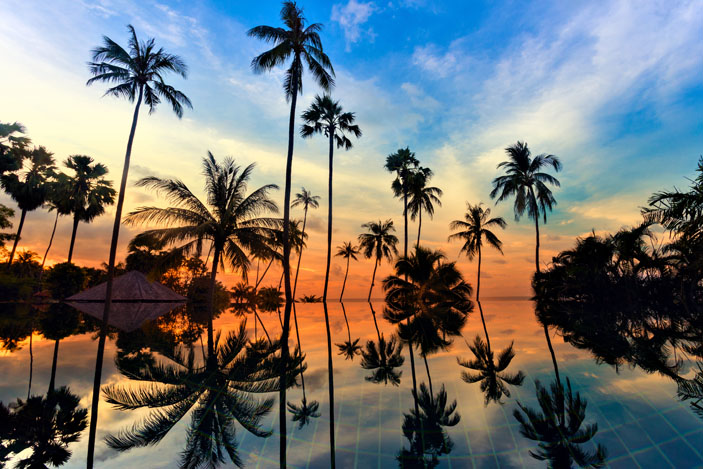AFTER a life of entertaining the masses on air and at shows in Singapore, radio personality and emcee Hamish Brown opted for a quieter life in Koh Samui.
In this new life of extra long weekends, he dangles an envious lifestyle in front of us. Do we have what it takes to seek greener pastures. What are the trade offs? Most folks will retreat to the comfort of their HDB flats and taking what is dished out. Others try and figure out why the grass is greener elsewhere.
Retirement is natural. Just like the passage of time from sunrise to sunset.
Early retirement is a luxury. It is a reward you give yourself as an exit strategy from the rat race. But early retirement in another country altogether, now that’s when you really are going against the grain.
If you were to ask most Singaporeans where their favourite destinations are in Thailand, Koh Samui is very likely not on the list that they will rattle off.
Bangkok, Phuket, Krabi, Pataya and Chiang Mai more likely. You wouldn’t be wrong and I am quite happy for it to stay that way. Paradise needs to retain a sense of mysticism, magic and wonder for the intrepid traveller who seeks Shangri-La.
But that is not to say that we live as new age hermits up here on the hill. There are small concessions to the 21st century. We have fibre optic cable even here in the jungle that connects us to the world. Wi-fi is readily available in pretty much every restaurant or shopping mall and air-conditioning is installed in most villas and condos.
When friends from Singapore ask, “What do you do all day?”, we answer “We are very busy living … full lives.”
It may sound too glib an answer for some and it probably frustrates a lot of our friends back in Singapore but that, indeed, is the truth. We felt that it was the right time to quit the rat race, realise our assets and truly start to enjoy life while both of us still had enough good years left in us to do so and the means with which to do it. It was an easy decision. And now we are living the dream and living life to its fullest and on our terms.
Why Koh Samui?
I first came to this amazing island in the mid ’90s. I was immediately taken in by its rustic charm and quaintness. Where Phuket was charging ahead with progress and development, Koh Samui still held on to its natural beauty and you sensed that as soon as you alighted from the plane and were greeted with arguably the quaintest international airport in Asia.
The island is lush with green. One gets the sense that the islanders themselves understand that the magic of the island lies in the preservation of its natural beauty and charm against the steady march of progress.
On Koh Samui there is a standing regulation that buildings at a certain height above sea level are only allowed to be built to no more than 6m in height and can occupy only 30% of a rai of land. A rai isn’t quite an acre but you get the general idea. Being turned into an urban jungle is not on the cards of Koh Samui.
Turning on the charm and the smiles though are. The warm welcome, the friendly banter, the intoxicating pull of the island’s mystique all worked its spell on me. I promised myself back then that when I was ready to retire, God willing, I would retire here.
Convincing my wife, Lena, wasn’t hard. She too had led a very dynamic corporate life and had reached a stage where she felt that it was time to let go and start really living to enjoy life. I told her of my retirement dream and, although Lena had travelled the world extensively as part of her career, she had never visited Koh Samui herself. A short vacation trip to the island convinced her of what I already knew and we set our plans in motion.
Hit The Road
Koh Samui is the second largest island in Thailand after Phuket. We hired a car and drove around Koh Samui on its ring road to discover more of its charms. The ring road, as its name implies, rings the island and takes you about an hour to make a full round. It is a very serviceable two-way road and has perhaps no more than half-a-dozen traffic lights.It has off roads going up into the hills and down to the beaches fracturing off from it but all these fissures always lead back to the ring road and with that knowledge in mind, one can never truly get lost.
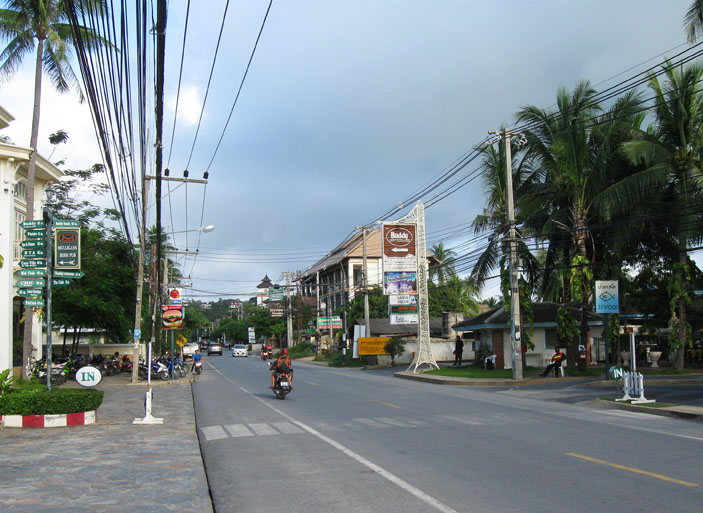 Driving habits on Samui are also vastly different from Singapore. Locals tend to give way a little more and for the most part, aren’t in any big rush to go anywhere. You do find reckless motorbike riders who will undertake you by the left if they cant overtake you on the right and more often than not, a lot of accidents that happen are caused by tourists who forget which side of the road they are supposed to be on and speed with the standard assumption that ‘right of way’ as in the West is the universal law elsewhere.
Driving habits on Samui are also vastly different from Singapore. Locals tend to give way a little more and for the most part, aren’t in any big rush to go anywhere. You do find reckless motorbike riders who will undertake you by the left if they cant overtake you on the right and more often than not, a lot of accidents that happen are caused by tourists who forget which side of the road they are supposed to be on and speed with the standard assumption that ‘right of way’ as in the West is the universal law elsewhere.
The average Samui driver on the ring road and with the ‘right of way’, thinks nothing of slowing down and stopping to give way to a driver trying to turn from a side road to the ring road. It is a quirk that will keep you in good stead if you are driving on Koh Samui. And makes for a much better driving experience than if you were to apply the ‘me first’ mindset that is prevalent in Singapore and lots of other communities.
Another interesting point, the car horn is hardly ever used on Samui. It’s actually thought of as being extremely rude. Patience and a smile will make your day go much better on the roads.
Speaking of roads, we purchased our diesel powered Toyota Fortuner 4 wheel drive with all the bells and whistles, plus road tax for a year and insurance thrown in for good measure, for S$57,000 all in. That’s it. No COE, no yearly vehicle inspections and no parking charges. Add to that was the freedom from electronic road pricing gantries. And we actually own the car, without having to give it up after 10 years. Quite a welcome change indeed.
You Might Also Like To Read:
How To Choose A Good Business Name
Dream Home
A few more trips to the island ensued over the next couple of months as we looked at lots of potential villas and townhouses to call home. We also sampled both local and international cuisine from excellent restaurants and small, hole in the wall dives. Here’s a little known fact for food lovers, Koh Samui is a haven for great international and local food. Lots of retired chefs come here, settle down, and open up restaurants and their expertise is phenomenal.

We found our dream home overlooking the Gulf Of Thailand up in the hills of Bophut after looking at more than 20 villas and townhouses. It was about the cost of a 4-room HDB. But it came with an infinity pool, lots of large windows with natural lighting and arguably the best view on the island.
When Lena stepped into the house and had her first look at the view, she was sold. The house also had space for a garden that we have now used to cultivate fruit trees like bananas, mangoes and papayas and herbs like rosemary, dill and basil as well as chillies and cherry tomatoes for all our dishes that we cook together at home.
Life on Koh Samui is the quintessential idea of an idyllic tropical escape. Everyone here lives, works and plays in a combination of sundresses, t-shirts, bermudas and slippers. This is island style living at its laid back best.

Despite its rustic charms, Samui has four hospitals with top grade facilities and a few international schools for expatriate kids. Its dental facilities are world class and at last count it has 4 supermarket chains, 2 new shopping centres, plenty of on the beach restaurants and a great selection of hotels ranging from B&Bs to 5-star glories.
In addition, Samui’s locals live up to Thailand’s famous saying ‘The Land Of Smiles’. They smile all the time. I sense that it comes from within. The island is blessed with a people rich in spirit and warmth.
Being retired and having more time for ourselves makes one more attuned to the things around us. We notice the little things. Things, that in an urban environment, one would easily overlook or ignore altogether.
Attitude Adjustments Required
Some of these things are fairly obvious while others you discover only with the passage of time or with the onset of seasonal monsoon weather shifts. These are things that impact you in spite of their seeming insignificance. A reminder, here in the natural state, that everything is connected and that one needs to make sure that it’s all in proper balance for the world to be good again. And these little things are surprising indeed.
The warm yellow hues of sunrise or sunset for instance, across the green swathes of vegetation in our valley below is a truly overwhelming sight. We perk up at the sounds of nature all around us. The cacophony of birds and insects during mating season and when the seasons change from dry to wet are quite something. In the evenings, the sounds change again. That’s the time when the nocturnal creatures come out to forage and you are privy to the sounds of tokays and other nocturnal fauna.
We revel in discovering new butterflies that fly by our windows and enjoy visits from colourful birds that stop by for a quick dip in our pool or a short stop for a drink in it. It’s really, the little things indeed.
I have learned to appreciate the land more and to value its life giving resources. We have come to be very thankful for rain. In addition to our deep well water resource, we have installed guttering for our house to collect rainwater in our three, 3,000-litre tanks that are housed below our villa and we have installed a filtration system to purify it for our daily use.
I have also learned to operate a generator in the event of a power outage. We do get them from time to time on Koh Samui but one learns to adapt and roll with the punches. I can guarantee that operating a portable generator is a skill that not a lot of Singaporeans would be familiar with.
You Might Also Like To Read:
Orchard Credit’s Nursery For New Ideas
Building A Cybersecurity Eco-System
Imagine if a power outage happened in Singapore. We would be frantically calling Singapore Power to complain about it and badger the authorities for an answer about when power would be restored.
Not here, though. We do have a hotline to the Public Electrical Authority or PEA and that’s who you call to inform them of the power outage. What then happens is they will look into it while you switch over to generator power until normal power returns. Or you could decide to wait it out and do other things. Go out for a few hours, run errands or catch up for a coffee with a friend at a restaurant or pub.
Life here is all about adaptation. You learn quickly and move forward.
Our next project in the pipeline is solar panels as we get lots of sun on the island and it seems a no brainer. Appreciating Earth and all her resources. These are valuable lessons that are never truly embraced in an urban setting but are highly prized here. Learn. And move forward.
Still Connected
Koh Samui is about a third the size of Singapore. Yet its indigenous population is only about 60,000.. It has a string of international hotels as well as several boutique hotels and lots of B&B accommodation so the traveller is spoilt for choice from back-packer digs to 5-star indulgence. Despite the abundance of rooms on the island, it isn’t crowded and it’s all the more beautiful for it.
There are small concessions to the 21st century. We have fibre optic cable even here in the jungle that connects us to the world. Wi-fi is readily available in pretty much every restaurant or shopping mall and air-conditioning is installed in most villas and condos .
As retired expatriates ourselves, we quickly found out that we had a little neighbourhood community comprising an eclectic mix of French, Australian, Scottish, Welsh, American, Filipino, English, Omani, Mauritian, Iranian and Mongolian neighbours in addition to a few friendly Thais who run family business like mom and pop sundry and laundry shops at the base of our hill.
We were amazed to have made friends with our neighbours within the first month of arriving here. Getting to know them by their first names and being invited over for drinks and dinners as part of being the new neighbours on the block.
It was exciting.
And yet I also felt a certain sense of guilt and embarrassment because I also recollected how diametrically hard it was to make contact with the neighbours I had in our condo back in Singapore.
It made me recall the time back when we were living in Singapore in our 500-unit condo development in West Coast, the irony of how, after four years there, we hardly knew our immediate neighbour and only knew of one other family that happened to be living on another floor in the same block and even then, only because we kept meeting each other in the lift.
This was the inevitable reality of urban living – close, but still so very far away from each other.
4 Steps To Paradise
The requirements for retiring in Thailand aren’t all that difficult.
One has to be 50 years old at least to apply for a retirement visa.
You must have sufficient finances — Baht 800,000 (S$33,000) in a Thai bank account.
You cannot have any criminal offences.
You must have a clean bill of health certified by a doctor.
If you do consider retirement here, I would suggest coming to visit for a short stay first – a month or two to see if you can adjust to the change. Not all Singaporeans who are used to having everything done for them at the press of a telephone button can make the shift in thinking. But for those that do, the rewards are immense.












